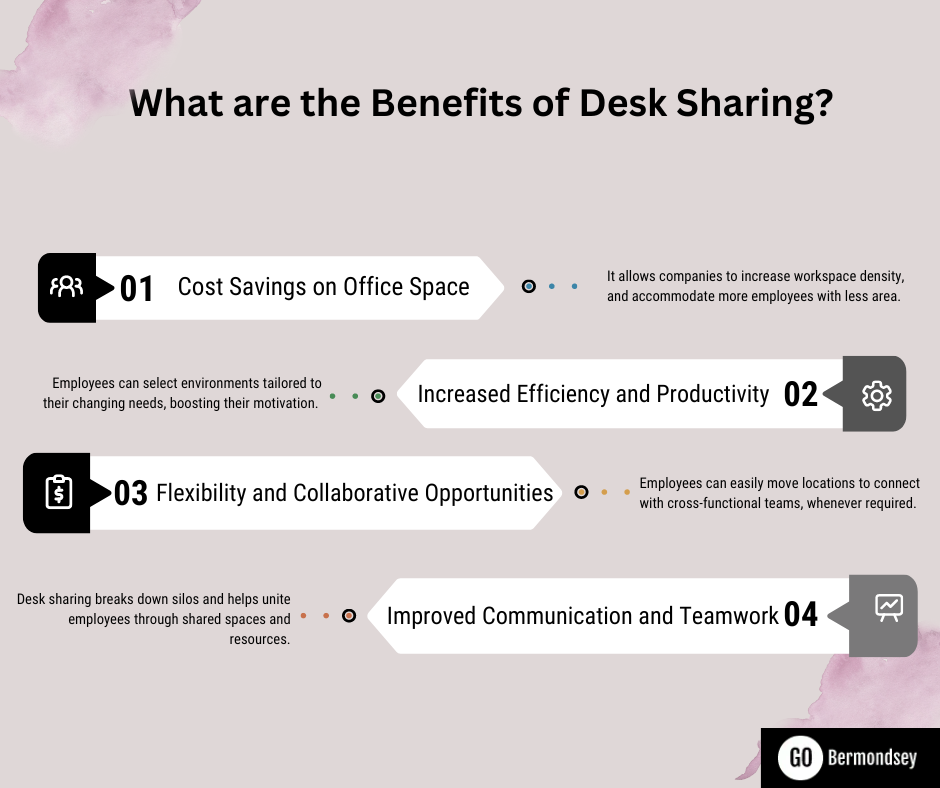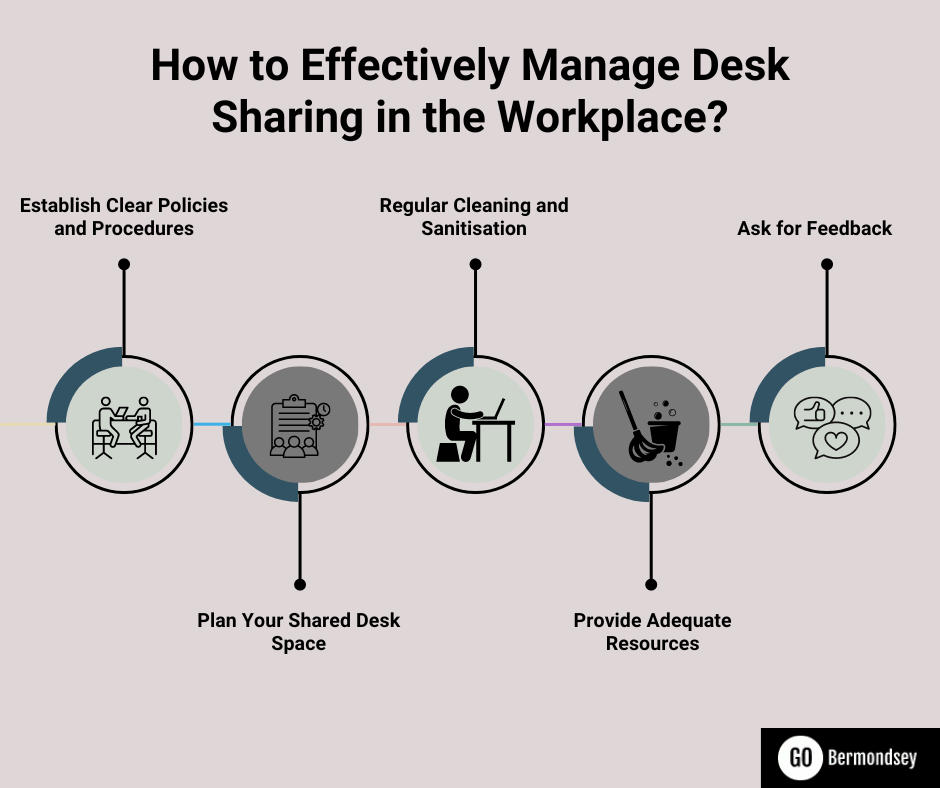What is Desk Sharing and How to Maintain it?
February 27, 2024Desk sharing allows companies to optimise office seating density, reduce real estate costs, and support more flexible, collaborative work styles.
Desk sharing allows companies to optimise office seating density, reduce real estate costs, and support more flexible, collaborative work styles.
A recent survey revealed that a majority of business leaders are reducing their office space, with 21% planning to decrease their own office footprint, 37% intending to switch to more flexible co-working areas, and 7% having already downsized. Why?
Today’s hybrid work culture has made companies realise that they may not require a large office space, since all the employees may not be physically present in the office. This also means that a lot of companies may not require a dedicated desk for every worker, and a shared desk office model can be a better option.
In a shared desk setting, multiple employees work from a single desk, significantly impacting the real estate costs per sq ft. However, for a shared desk model to be viable, the office layout and policies must be thoughtfully designed to enable productivity and satisfaction. If the workspace and guidelines are not optimised, a shared desk approach could hamper teamwork, focus, and engagement.
This article provides best practices for implementing and maintaining a shared desk environment that benefits both the staff and the organisation.
Desk sharing is an office arrangement wherein desks in a workspace are shared by multiple employees rather than being permanently assigned to individuals. With desk sharing models, multiple employees utilise the same desk, to meet their deadlines. This approach allows companies to optimise office seating density, reduce real estate costs, and support more flexible, collaborative work styles.

Whether you are in need of fully serviced Private office or a meeting room, Garden Office Bermondsey have it all
Here are some benefits of desk sharing:
Recent statistics show that 40% of an organisation’s desk space remains unused. Desk sharing can rectify this. It allows companies to increase workspace density and accommodate more employees with less area. The shared use of desks means organisations can maintain or grow their headcount with smaller office spaces, translating to significant savings on rent and property expenses.
Desk sharing boosts productivity and collaboration through flexible, shared workspaces. Employees can select environments tailored to their changing needs, boosting their motivation. In fact, a recent study showed that 43% of employees agree that desk sharing leads to a better work-life balance.
Desk sharing arrangements allow employees the flexibility to work from different areas of the office. Employees can sit next to the colleagues they need to collaborate with. Moreover, they can easily move locations to connect with cross-functional teams, whenever required. Therefore, desk sharing enables employees to work independently as well as in a team.
Desk sharing breaks down silos and helps unite employees through shared spaces and resources. This communal environment nurtures teamwork, connectivity and collaboration between colleagues across the organisation.
Also read, Dedicated desk vs Flexi Desk

Successfully implementing desk sharing in your workspace requires understanding a few points:
Implementing clear policies and procedures is key to effectively managing shared workspaces. Companies should develop guidelines on desk usage – how employees can locate and select available desks each day, protocols for keeping shared work areas tidy, and rules regarding personal items. Well-defined policies empower employees to utilise shared spaces properly.
Thoughtful planning of the desk sharing space facilitates an organised experience. The first consideration is having ample desk space for the entire team. Providing adequate power outlets in desk areas along with shared equipment like monitors is essential. Consider the need for other areas in the office to meet specific work demands. Ultimately, a well-organised space enhances seamless workflow.
Proper cleaning and sanitisation are essential for shared work environments. Desks, chairs, and equipment should be cleaned and disinfected regularly. Companies can also provide supplies like wipes so that employees can sanitise surfaces after use. When implementing desk sharing, cleaning schedules should be supplemented with daily cleaning and deep cleanings during off-hours.
Employees need to be able to work productively from any available shared desk. Wireless internet access, shared printers, office supplies, and other tools should be reachable from all workstations. Resources like whiteboards and markers should be accessible to all the employees.
Regularly collect feedback from employees on their experiences with desk sharing. Be open to refining and changing policies, and space planning to address any needs or concerns that arise from those using the shared workspaces. Continual improvements based on employee input will result in more effective desk sharing arrangements.
Also Read, 7 ways to manage your workspace with flexi desk to get comfortable in your tasks
Desk sharing, hoteling and hot desking are terms that are often used interchangeably. However, they have different meanings:
This table outlines the key differences between Desk Sharing, Hoteling, and Hot Desks:
| Aspect | Desk Sharing | Hoteling | Hot Desks |
|---|---|---|---|
| Definition | Multiple employees share designated desks based on availability and schedules. | Employees reserve desks or workspaces on an as-needed basis. | Workstations are unassigned and available for use by any employee on a first-come, first-served basis. |
| Ownership | Desks are typically owned by the company and assigned to specific teams or departments. | The company owns the desks, but employees reserve them for temporary use. | Desks are owned by the company and open for use by any employee. |
| Reservation | No reservation system; desks are used based on availability. | Employees book desks in advance through a reservation system. | No reservation system; desks are available on a first-come, first-served basis. |
| Flexibility | Limited flexibility as desks are assigned to specific employees or teams. | High flexibility as employees can choose their workspace based on their needs. | High flexibility as employees can select any available desk each day. |
| Collaboration | Encourages collaboration among team members who share desks. | Facilitates collaboration as employees can choose to sit near colleagues they need to work with. | Promotes collaboration by allowing employees from different teams to sit together. |
| Privacy | Limited privacy as desks are shared among multiple employees. | Moderate privacy as employees can choose where to sit, but may still be in close proximity to others. | Limited privacy as employees may sit in close proximity to colleagues from different teams. |
| Workspace Setup | Personal items may be left at the desk but may be used by others when not in use. | Employees may personalize their workspace during their reservation period. | Personal items should be taken with the employee when they leave; desks are cleared for the next user. |
| Utilization | Often used in environments where employees have fixed schedules and work in the same location daily. | Suitable for organizations with flexible work arrangements where employees may not require a permanent desk. | Commonly adopted in coworking spaces or for organizations with remote or flexible work policies. |
| Maintenance | Desks may require regular cleaning and maintenance due to shared usage. | Desks may require cleaning between reservations to ensure a clean workspace for each user. | Desks should be cleaned regularly to maintain a clean and hygienic environment. |
When employees share desks in an office, following certain etiquettes helps ensure a respectful and productive environment for all. Here are some best practices to keep in mind:
At Garden Office Bermondsey, we provide office spaces designed to foster productivity and collaboration. Our office space is located in the heart of London and come equipped with all the amenities you need to work seamlessly. From meeting rooms to private offices, we provide workspaces that cater to businesses and teams across sizes. For more details, visit Garden Office Bermondsey today!